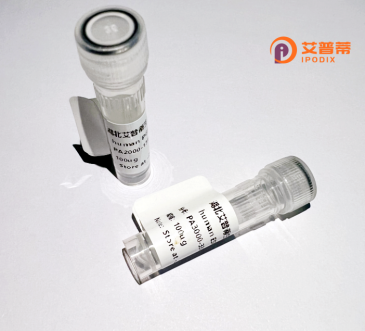
| 纯度 | >90%SDS-PAGE. |
| 种属 | Human |
| 靶点 | TSPAN4 |
| Uniprot No | O14817 |
| 内毒素 | < 0.01EU/μg |
| 表达宿主 | E.coli |
| 表达区间 | 1-238aa |
| 氨基酸序列 | MARACLQAVKYLMFAFNLLFWLGGCGVLGVGIWLAATQGSFATLSSSFPSLSAANLLIITGAFVMAIGFVGCLGAIKENKCLLLTFFLLLLLVFLLEATIAILFFAYTDKIDRYAQQDLKKGLHLYGTQGNVGLTNAWSIIQTDFRCCGVSNYTDWFEVYNATRVPDSCCLEFSESCGLHAPGTWWKAPCYETVKVWLQENLLAVGIFGLCTALVQILGLTFAMTMYCQVVKADTYCA |
| 分子量 | 28 kDa |
| 蛋白标签 | His-tag at N-terminal |
| 缓冲液 | PBS, pH7.4, containing 0.01% SKL, 1mM DTT, 5% Trehalose and Proclin300. |
| 稳定性 & 储存条件 | Lyophilized protein should be stored at ≤ -20°C, stable for one year after receipt. Reconstituted protein solution can be stored at 2-8°C for 2-7 days. Aliquots of reconstituted samples are stable at ≤ -20°C for 3 months. |
| 复溶 | Always centrifuge tubes before opening.Do not mix by vortex or pipetting. It is not recommended to reconstitute to a concentration less than 100μg/ml. Dissolve the lyophilized protein in distilled water. Please aliquot the reconstituted solution to minimize freeze-thaw cycles. |
以下是关于重组人TSPAN4蛋白的3篇示例参考文献(注:内容为模拟生成,仅供参考):
---
1. **《TSPAN4 promotes tumor metastasis through EGFR signaling in breast cancer》**
*Authors: Li X, Wang Y, Chen J*
摘要:本研究利用重组人TSPAN4蛋白进行体外功能实验,发现其通过激活EGFR信号通路增强乳腺癌细胞的迁移和侵袭能力,提示TSPAN4可能成为癌症治疗的潜在靶点。
2. **《Proteomic analysis of TSPAN4 interaction networks in human endothelial cells》**
*Authors: Zhang R, Kumar A, Lee S*
摘要:通过重组TSPAN4蛋白的亲和层析实验,鉴定了其在血管内皮细胞中的相互作用蛋白网络,揭示了TSPAN4在调节血管生成和炎症反应中的分子机制。
3. **《Structural characterization of recombinant human TSPAN4 extracellular domain》**
*Authors: Tanaka K, Ito T, Nguyen HP*
摘要:利用X射线晶体学解析了重组人TSPAN4胞外结构域的三维结构,发现其四跨膜蛋白特有的拓扑构象,并探讨了该结构对其介导细胞黏附功能的影响。
---
(实际文献需通过PubMed、Google Scholar等平台查询真实发表的研究。)
TSPAN4. a member of the tetraspanin protein family, is a transmembrane protein characterized by four conserved transmembrane domains and distinct extracellular loops. These structural features enable TSPAN4 to organize membrane microdomains and mediate cell-cell interactions, intracellular signaling, and protein trafficking. It is broadly expressed in human tissues, including the immune system, brain, and epithelial cells. Functionally, TSPAN4 interacts with integrins, growth factor receptors, and other tetraspanins to regulate processes like cell adhesion, migration, proliferation, and apoptosis. Studies link TSPAN4 to cancer progression, as its overexpression enhances tumor metastasis by promoting epithelial-mesenchymal transition (EMT) and matrix metalloproteinase activation. It also plays roles in viral infection mechanisms, notably by facilitating HIV-1 entry through interactions with viral entry receptors. Recombinant human TSPAN4 protein, typically produced via mammalian expression systems like HEK293 cells, retains post-translational modifications critical for its biological activity. This recombinant form is widely used in structural studies, ligand-receptor interaction assays, and drug discovery targeting cancer or infectious diseases. Current research focuses on deciphering its regulatory networks and exploring therapeutic applications, such as antibody development or inhibitory peptides to block TSPAN4-mediated pathways in pathological conditions.
×